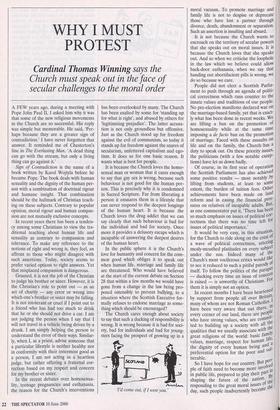WHY I MUST PROTEST
Cardinal Thomas Winning says the
Church must speak out in the face of secular challenges to the moral order
A FEW years ago, during a meeting with Pope John Paul II, I asked him why it was that some of the new religious movements in the Church are so successful. His reply was simple but memorable. He said, 'Per- haps because they are a greater sign of contradiction.' I have never forgotten that answer. It reminded me of Chesterton's line in The Everlasting Man. 'A dead thing can go with the stream, but only a living thing can go against it.'
Sign of Contradiction is the name of a book written by Karol Wojtyla before he became Pope. The book deals with human sexuality and the dignity of the human per- son with a combination of doctrinal rigour and humane insight. That combination should be the hallmark of Christian teach- ing on these subjects. Contrary to popular opinion, moral rigour and human compas- sion are not mutually exclusive concepts.
In recent years there has been a tenden- cy among some Christians to view the tra- ditional teaching about human life and sexuality as contrary to compassion and tolerance. To make any reference to the notions of right and wrong is, they feel, an affront to those who might disagree with such assertions. Today, society seems to prefer varied options to right answers. Yet that misplaced compassion is dangerous.
Granted, it is not the job of the Christian to judge his brother or sister. However, it is the Christian's role to point out — as an act of charity — any error or wrong into which one's brother or sister may be falling. It is not intolerant or cruel if I point out to a friend who has had too much to drink that he or she should not drive a car. I am not judging the person when I say that I will not travel in a vehicle being driven by a drunk. I am simply helping the person to understand the error of their ways. Similar- ly, when I, as a priest, advise someone that a particular lifestyle is neither healthy nor in conformity with their innermost good as a person, I am not acting as a heartless judge, but rather offering a fraternal cor- rection based on my respect and concern for my brother or sister.
In the recent debates over homosexua- lity, teenage pregnancies and euthanasia, the reason for the Church's interventions has been overlooked by many. The Church has been exalted by some for 'standing up for what is right', and abused by others for `legitimising prejudice'. The latter accusa- tion is not only groundless but offensive. Just as the Church stood up for freedom against the evil of communism, so today it stands up for freedom against the snares of secularism, unfettered capitalism and ego- tism. It does so for one basic reason. It wants what is best for people.
It is because the Church loves the homo- sexual man or woman that it cares enough to say that gay sex is wrong, because such behaviour is not good for the human per- son. This is precisely why it is condemned in Sacred Scripture. Far from liberating a person it ensnares them in a lifestyle that can never respond to the deepest longings of the human heart. It is because the Church loves the drug addict that we can say clearly that such behaviour is bad for the individual and bad for society. Once more it provides a delusory escape which is incapable of answering the deepest desires of the human heart.
In the public sphere it is the Church's love for humanity and concern for the com- mon good which obliges it to speak out when human life, marriage and family life are threatened. Who would have believed at the start of the current debate on Section 28 that within a few months we would have gone from a change in the law being pro- posed ostensibly to prevent bullying, to a situation where the Scottish Executive for- mally refuses to endorse marriage as some- thing which should be encouraged?
The Church cares enough about society to say that such a ducking of responsibility is wrong. It is wrong because it is bad for soci- ety, bad for individuals and bad for young- sters facing the prospect of growing up in a 'I'd come out if I were you.' moral vacuum. To promote marriage and family life is not to despise or deprecate those who have lost a partner through divorce, death, abandonment or separation. Such an assertion is insulting and absurd.
It is not because the Church wants to encroach on the territory of secular powers that she speaks out on moral issues. It is because the Church loves that she speaks out. And so when we criticise the loophole in the law which we believe could allow back-door euthanasia, when we say that handing out abortifacient pills is wrong, we do so because we care.
People did not elect a Scottish Parlia- ment to push through an agenda of politi- cal correctness which runs counter to the innate values and traditions of our people. No pre-election manifesto declared war on the marriage-based family, yet that is exact- ly what has been done in recent weeks. We are lifting a ban on the promotion of homosexuality while at the same time imposing a de facto ban on the promotion of marriage. Faced with these assaults on life and on the family, the Church has a duty to speak out. On these priority issues, the politicians (with a few notable excep- tions) have let us down badly. Of course, in its first year of operation the Scottish Parliament has also achieved some positive results — most notably by lifting from students, at least to some extent, the burden of tuition fees. Other achievements have been made on land reform and in easing the financial pres- sures on relatives of incapable adults. But, as one commentator put it, 'There has been so much emphasis on issues of political Or' rectness that there was no time left for issues of political importance.' It would be very easy, in this situation, for the Church to ride along on the crest of a wave of political correctness, uttering mealy-mouthed platitudes on every subject under the sun. Indeed many of the Church's most vociferous critics would like. to see it reduced to such a pitiful parody 01 itself. To follow the politics of the parapet — ducking every time an issue of concern is raised — is unworthy of Christians. J them it is simply not an option. In recent months I have been heartened by support from people all over Britain! many of whom are not Roman Catholics.,1 have been very aware that out there, line every corner of our land, there are people who have strong values, who are commit ted to building up a society with all the qualities that we usually associate great religions of the world: basic farni.elY values, marriage, respect for human lin a the dignity of every human being On preferential option for the poor and vw nerable. co- So I have hope for our country. But p ple of faith need to become more involved art with the great public life, prepared to play their p shaping the future of the nation.,, fire responding to the great moral issues 01 the day, such people inadvertently become the title of that book written in Poland more than a quarter of a century ago — a sign of contradiction.
It's not an easy challenge that I lay down to such people. But didn't Jesus say that the world hated Him too, and didn't He warn His followers not to expect anything different? In an age when standing up for His values is an increasingly hazardous occupation, I find consolation in that.

































































 Previous page
Previous page